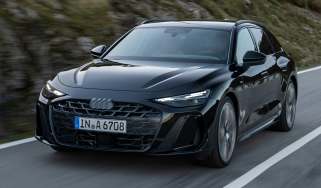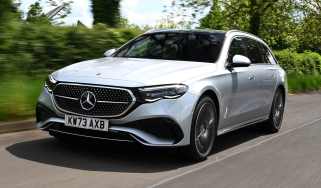Peugeot 308 SW MPV / Estate (2008-2014)
"With up to seven seats and a large boot, the Peugeot 308 SW is a practical and spacious family car."
Pros
- Fantastic practicality
- High quality cabin
- Seven-seat option
Cons
- High list prices
- Reliability is below average
- Difficult gearchange
Peugeot’s 308 SW has an edge over conventional rivals like the Ford Focus Estate and Volkswagen Golf Estate when it comes to practicality. The massive boot and an array of useful features - like the optional seven seat layout - make it a fine choice for big families. It’s not all good news though… The 308 SW is considerably more expensive than the hatchback on which it's based, and the rear design looks awkward. What’s more, modern rivals like the Nissan Qashqai+2 offer more versatile interiors and a better driving experience.
MPG, running costs & CO2
Like the hatchback, the 308 SW is not dear to run, though it is outclassed by the Golf estate. The most frugal version is the HDi 90, which returns 60.1mpg and 125g/km. The least economical is the petrol 1.6 THP 156 with 39.8mpg and emissions of 165g/km, but that’s still respectable.
Engines, drive & performance
The SW doesn't have the same wide range of engines as the hatchback. It makes do with two 1.6-litre petrol engines, one of which is turbocharged, two 1.6 HDi diesels and a 134bhp 2.0 HDi. All the engines are powerful enough, but the best all-rounder is the mid-range 1.6 HDi with 108bhp - it's cheap to run, smooth and fast enough. The driving position feels a little offset to the right, which lets the Peugeot down, and the manual gearbox has a notchy gear change, but apart from that, the steering is precise and the car feels sure-footed on the road.
Interior & comfort
There's no doubting the Peugeot 308's excellent comfort. There's hardly any wind or road noise, and although the petrol engines can become a little loud when revved hard, the noise is never too intrusive, and the diesels are silky smooth. The ride is generally comfortable, but bumpy roads will unsettle the 308.
Practicality & boot space
This is where the SW shines over the 308 hatchback. Each of the middle row of seats can easily be removed to create maximum load space. There's an impressive 674 litres available with the rear seats in place, but take them away and you have a truly cavernous 2,149 litres. Handy features like storage drawers under the rear seats and a covered area on the parcel shelf carry over from the 308 hatchback, too. There's even a useful separately-opening glass tailgate on some models.
Reliability & safety
Safety is another of the 308's trump cards - it scores five Euro NCAP stars for adult occupant safety, four for child safety and three for pedestrian safety, which is impressive. There are plenty of additional features too, like six airbags as standard, deadlocks and remote central locking across the range. The 308 SW didn't appear in the 2010 Driver Power Reliability survey, but Peugeot was ranked 24th out of 27 manufacturers in the 2010 JD Power Satisfaction survey.
Price, value for money & options
It's a given that a larger estate car will always cost more than its hatchback equivalent, but while the 308 SW isn't drastically overpriced, it does seem dear in comparison. Entry-level S models come with a folding rear bench seat, electric windows, air-conditioning and a trip computer. Sport spec is a better option; it includes 17-inch alloys, electronic stability control, separately-opening rear tailgate glass and cruise control. Resale values are better for the SW than they are for the 308 hatchback, but other family cars do better still, such as the Volkswagen Golf.
Which Is Best?
Cheapest
- Name1.2 Hybrid 145 Allure 5dr e-DSC6
- Gearbox typeSemi-auto
- RRP£34,365
Most Economical
- Name1.6 Plug-in Hybrid 195 Allure 5dr e-DSC7
- Gearbox typeSemi-auto
- RRP£39,300
Fastest
- Name1.6 Plug-in Hybrid 195 Allure 5dr e-DSC7
- Gearbox typeSemi-auto
- RRP£39,300










